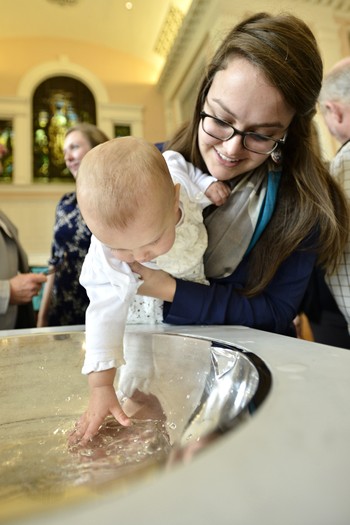
LOUISVILLE
At Central Presbyterian Church in Louisville, Molly Atkinson holds her 10-month-old niece, Nora, as she touches her baptismal water.
At Central Presbyterian Church in Louisville, Molly Atkinson holds her 10-month-old niece, Nora, as she touches her baptismal water.
The following article was originally printed in the November/December 2015 issue, “Hope in a child,” of Presbyterians Today.
Baptism is one of two sacraments practiced by Presbyterians; Communion is the other. The act of baptism is deceptively simple—but in a handful of water, there is a deep well of mystery and meaning.
In baptism, we are called to a new way of life as Christ’s disciples, sharing the good news of the gospel with all the world.
Presbyterians describe baptism as a sign and seal of the covenant of grace made by God through Jesus and extended to us. In baptism, God claims us as beloved children and members of Christ’s body, the church, washing us clean from sin as we renounce the power of evil and seek the will and way of God.
Presbyterians have recognized baptism as one of two sacraments initiated by Christ in Scripture. All four Gospels report the baptism of Jesus by John in the Jordan River (Matt. 3:13–17; Mark 1:9–11; Luke 3:21–22; John 1:29–34). When we are baptized with water in the name of the Trinity, we share in Christ’s own baptism.
Presbyterians celebrate baptism as a communal act of public worship. In the Middle Ages, baptism came to be an increasingly private, family affair, separated from worship. The Protestant Reformation sought to change that, arguing that the power of baptism did not come from the act itself but from its connection with the promise of God conveyed in Scripture. That’s why Presbyterian baptism is always accompanied by the proclamation of the Word in the context of public worship. Luther and Calvin also insisted that baptism be followed by ongoing instruction in the faith, particularly through the study of the Bible and catechisms.
Presbyterians practice both adult and infant baptism. Infant baptism expresses that it is God who chooses us for faith, discipleship, and salvation; without God, we have no power to claim these things for ourselves. However, we affirm that people come to faith at different stages in life, and recognize the baptism of older believers as an equally valid expression of the sacrament.
While pouring or sprinkling water upon the head is most common, Presbyterians also allow for baptism by immersion. Whatever the method, the deep significance of baptism demands a visible and generous use of water, conveying the lavish outpouring of God’s grace, filling believers with the gifts of the Spirit, and overflowing in lives of faithfulness, service, and love.
A teaching elder—a pastor—must preside at the baptism, but it is a congregation’s session (or ruling council) that authorizes baptisms and provides for the spiritual growth and nurture of members. That’s why a ruling elder of the church always presents the candidate for baptism. In turn, both the family and the congregation promise to contribute to the baptized person’s Christian formation.
Can anyone be baptized? Yes! Christ’s gracious invitation is open to all. However, baptism is but the beginning of a lifelong process of formation in the faith.
Can a person who is not baptized be saved? In a word, yes; but this by no means diminishes the importance of the sacrament. To insist on baptism as necessary for salvation would be to impinge on the limitless sovereignty of God, one of the essentials of the Reformed theological tradition. At the same time, baptism is an indispensable part of Christian life (Rom. 6:3–4), Christian identity (Gal. 3:27–28), and the church’s mission (Matt. 28:19).
Do non-Presbyterians need to be baptized when joining the Presbyterian Church (U.S.A.)? Not if they were previously baptized. The PC(USA) recognizes all baptisms with water in the name of the Father, of the Son, and of the Holy Spirit administered by other Christian churches.
So remember your baptism and be thankful! In the sacrament of baptism—our inclusion in the covenant of grace, incorporation into the life of Christ, and anointing with the gifts of the Spirit—we have countless reasons to give God thanks and praise. As Jesus said, “Out of the believer’s heart shall flow rivers of living water” (John 7:38). Filled with the never-failing grace of Jesus Christ poured out for us, our hearts overflow with gratitude and joy, spilling out into the world in lives of service and love for God and neighbor.
This column is adapted from a four-page article published by The Presbyterian Leader. For the full version:
pcusastore.com (search by title). David Gambrell is associate for worship in the Office of Theology and Worship of the Presbyterian Church (U.S.A.).

3104 Doe Run Church Road East Fallowfield, PA 19320
610-486-0744